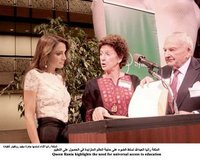by Natasha Tynes | May 15, 2012 | Everyday me!, Media watch
 Social media are easy to use, but those quick tweets and status updates can be dangerous for journalists who want to keep their jobs.
Social media are easy to use, but those quick tweets and status updates can be dangerous for journalists who want to keep their jobs.
As more journalists get reprimanded or fired by employers over social media, former CNN correspondent Octavia Nasr told IJNet in an interview that employers should hold employees accountable to company standards and practices–not to the negative publicity their social media activities may generate.
In 2010, Nasr’s opinionated tweet from her official CNN account about the death of Hezbollah leader Sayyed Mohammed Hussein Fadlallah ended her 20-year career at CNN.
Though social media led to her ousting, Nasr still embraces it. Shortly after parting ways with CNN, she established Bridges Media Consulting which specializes in newsroom management, journalism training and social media integration.
Nasr, who says the most important milestone for Bridges is to “actually be operational,” talked to IJNet about the controversy and the pitfalls and possibilities of social media for journalists.
IJNet: What would you do differently today if you were to write that tweet about Fadlallah?
Octavia Nasr: I wouldn’t send out the tweet at all. It was not an important tweet to start with in the big scheme of things. I was on vacation, I shouldn’t have been thinking about work or sending the tweet out about Fadlallah or his relevance.
If I must tweet, I would’ve tweeted that he passed away without any extra information. Let people find out on their own who he was and what his worth was. I tried to put too much information into 140 characters while the story needed a lot of context. By doing so, I opened the door to a small but powerful and effective group of agenda-driven people to attack CNN through me.
IJNet: How did the controversy with CNN change your views on social media and how you advise your clients?
ON: It did not change anything. Quite the contrary, it confirmed all the things I already knew and was teaching (and still teach) to others about social media. I became a living example of the successes and perils of social media.
What happened with me can happen with anyone at any time, it was not what I tweeted or how I tweeted it, it was the reaction to my tweet and CNN’s response to that reaction that led to CNN and I parting ways. This is only an excuse that anyone can pull at any time and people need to be ready for it if they are using social media on behalf of their employer or any other entity.
IJNet: The social media policies for major media organizations range from very restrictive to pretty open — from “watch the retweets” (AP) to just “don’t be stupid” (BBC) – what do you think is the right balance?
ON: The right balance is to act on social media exactly the same way you do in real life knowing very well that your tweet is a permanent record. Use restraint and don’t share unnecessary information that might come back and haunt you. Of course “don’t be stupid” and “watch the retweets” are the extremes that one should avoid at any cost, but it’s the wide margin in between that concerns me and where I find most users are vulnerable.
The problem is not what you say or what you mean but rather how people perceive it, analyze it and deal with it that concerns me a lot. An innocent comment that is attacked by a major organization or group all of sudden will sound “stupid;” but if no one complains about it passes without incident. On the other hand, a major offense can go unnoticed and unpunished because no one complained about it or because those complaining do not have muscle.
The point I like to stress to employers is that they should hold their employees accountable to the company’s standards and practices not the level of support or condemnation their tweets receive. Not all complaints are fair and not all cheers are warranted. The company should lead based on its policy and it should act according to its code of conduct and ethics not the public’s reaction or outcry. On the other hand, to employees I stress that they should get their employer’s commitment in writing that in the case of controversy or complaint, their right to fair investigation is preserved.
Without an upfront commitment from the employer to stand by and protect employees from astroturfing and negative publicity, my advice to employees is not to use social media on behalf of their employer, period.
This Q&A is the first in a two-part interview with Nasr. You can follow her on Twitter and read more about her on her personal website.
by Natasha Tynes | Sep 20, 2010 | Everyday me!, Media watch, Religion
While the US media was having a field day with a non-story about a fringe pastor who wanted to burn the Quran, and while Islamophobia and anti-Muslim incidents were skyrocketing including urinating in a mosque and attacking a Muslim cab driver, young Muslims in a small city in the Middle East delivered flowers to a church. This was a “gesture of peace and coexistence,” the group of young Jordanian Muslims who delivered the flowers said.

Photo credit: Thameen Kheetan - The Jordan Times
“Shall we burn a copy of the Bible as a response to that? No, this is not what should be done,” Zeid Oweidi who was among a group of ten Jordanians told reporters at the Greek Orthodox Church in Amman last week. His comments were made against the backdrop of threats by Terry Jones, the pastor of a Florida church who planned to burn copies of the Quran on the 9th anniversary of the September 11 attacks.
While extremists in places like Afghanistan demonstrated violently over the planned burning of the Quran, young Jordanians last week simply walked to a nearby church following the evening prayers and delivered flowers.
Following this gesture, I received an Email from someone belonging to the Christian community in Jordan urging fellow Christians to reciprocate by delivering flowers to Muslims after Friday prayers. I guess in this case instead of violence begetting violence, goodwill begets yet even more goodwill.
Sadly, for the US media this was a non-story. Who cared about a small, stable country like Jordan? Who cared about a handful of young Muslims delivering flowers when there were others demonstrating violently? Which one would get readers’ attention, violence or flowers? Sadly, the US media chose violence. Who can compete with death and blood? The sexier always wins.
Covering this story and bringing it to the world’s attention is crucial these days. While the average American news consumer is currently being inundated with images of extremist Muslims, a small story like this one should have deserved at least a fraction of the coverage that the Florida priest fiasco received. I understand that this is not a national story and it didn’t happen on US soil but in this interconnected media sphere the location of the story doesn’t make a difference anymore. We have already experienced that. An angry mob in Beirut attacked a Western embassy in reaction to cartoons that appeared in a Danish newspaper, while demonstrators in Pakistan marched the streets in reaction to an off-beat announcement by a priest in small American city. Nowadays, every story is a global story.
The disappointing fact is that the US media failed twice in this case: first in blowing the story of the Florida priest out of proportion by giving this isolated, planned act (which never happened) more than its share of coverage, and bringing it to the attention of the global audience. The second was in ignoring acts of Muslim goodwill that would have clearly showed that while some Muslims might burn flags and effigies, there are others, like this group of young Jordanians, who would simply deliver flowers.
by Natasha Tynes | Sep 8, 2010 | Media watch, Religion
The first amendment is a genius piece of work. It gives American journalists the freedom to express and air information, it gives ordinary citizens the power to vocally criticize authority, and it also gives the priest of a small church in Florida the right to publically burn Qurans on the ninth anniversary of September 11.

Pastor Terry Jones. Photo credit: AP
Although burning a holy book doesn’t legally violate the US Constitution it is a clear provocation and should be, at least in my book, defined as hate speech. This priest in Florida knows he could do this but the question really is: should he? It is the same question that I ask the American media that has managed to blow this small story out of all proportion. This story could have been briefly covered as an isolated incident happening in a small Florida town. Instead, the media grabbed it and ran. They extensively covered it, analyzed it, and brought talking heads to debate it. Yes, they have the right to publish and air whatever they wish – and expand or diminish any event but, again, should they?
A story that could have been easily forgotten has now become an event that is being watched globally. It will go down as another example of “Muslim-hating Americans.” It will be exploited by extremists in their attempts to recruit future followers. In their attempts to extensively cover Islamophobia, can journalists actually endanger American lives?
The Arabic media has slowly started to pick up the story in the same pace that they picked up the Danish cartoons story which eventually unleashed more than a few bombshells. Here is a round up of the Arabic media coverage of the Quran burning story.
Media practitioners should be careful when they decide whether to cover or bury a story, for today the consequences of this decision can be grave.
Secretary of State Hillary Clinton appealed to the media today asking them not to cover the planned burning event on September 11 “as an act of patriotism.” I don’t see shying away from giving big attention to a small story as an act of patriotism per se, but mostly as a question of ethics. But ethics, as we well know, can be elusive.
by Natasha Tynes | Jul 8, 2010 | Everyday me!, Media watch, The Mideast

Octavia Nasr's tweet
As many of you have heard by now: CNN Senior Middle East correspondent Octavia Nasr has been fired over one single tweet. The 140 (or less) word burst said the following:
“Sad to hear of the passing of Sayyed Mohammad Hussein Fadlallah.. One of Hezbollah’s giants I respect a lot. #Lebanon”.
The tweet resulted in a public outcry with some accusing her of being a sympathizer of an group viewed by many in the US as a “terrorist” organization. CNN acted swiftly to the controversy by firing Nasr.
What a sad way to end the career of a veteran journalist liker her! Nasr and I exchanged a few “tweets” over the past months, and I highly admired her. I saw her as a passionate, hard-working journalist. She represented the best of Arabs. Unfortunately, she made a mistake by voicing her own opinion while working as journalist and representing CNN. In fact, her twitter user name was “octavianasrcnn,” which made it clear that her views were linked to CNN.
As a trained journalist myself, I regard what she did as an error in judgment. She must have gotten so carried away with all the Twitter excitement (which includes crowdsourcing and direct, personal interaction) that she forgot to abide by the fairly rigid rules of mainstream media. Journalists are not supposed to air their personal opinions when they present themselves as part of a news organization. There is no question about that. You will never be viewed as a balanced reporter when you publicly express your opinion, especially about a hot political issue like that of Hezbulah.
Nasr recognized her mistake and issued an apology, which I thought was the right thing to do.
However, this was not enough for CNN and they simply let her go. It’s disappointing. If I was her boss and I had to make the decision, I would have given her a warning and asked her to issue a public apology. Sacking her seems a bit excessive, especially for someone who has been working for the organization for two decades and has given so much. Why not give her a second chance?
In addition to putting the word “Hezoballa” and “Respect” in one sentence, Nasr has also made another mistake: she forgot or chose to forget the sad reality of the world we are living in, where there are many watching and waiting for public figures to make mistakes. Those of Arab/Middle Eastern backgrounds are scrutinized more than others. At least that is how things look these days. Think Helen Thomas, who made a similar mistake. Thomas shouldn’t have said what she said. It was unacceptable. Thomas also forgot today’s sad reality. Scrutiny is the name of the game. Forgiveness is no longer an option.
As a writer and a trained reporter from an Arab background I’m completely aware of this scrutiny. I remember when I first moved to the US and was looking for a job; a number of potential employers questioned my ethics as a reporter and asked me bluntly if I would be able to report on issues, like the Palestinian-Israeli topic for example, in a fair and balanced manner. They immediately assumed that I would be biased.
This sense of scrutiny follows me most of the time, so much so that I will likely write at least two or three drafts of this simple blog post to make sure I don’t make a public blunder. It’s sad and frustrating, but there is nothing much I can do about it.
Twitter or not, never forget to stick with basic ethics and make sound judgments, because yes, forgiveness is no longer an option.
by Natasha Tynes | Oct 2, 2008 | Jordan, my nation, Media watch
Petra News Agency, Jordan’s state news agency, decided to play the role of ultimate censor by altering a photo of Her Majesty Queen Rania of all people. Jordanian blogger Arab Observer exposed Petra’s manipulation of the photo! When will Petra News Agency realize that they can’t get away with this anymore?
Manipulating photos to make them more culturally acceptable should be a thing of the past because nothing can be hidden or altered these days thanks to an army of citizen journalists that has its eyes open all the time. The Slate original picture is on the left. The Petra ‘version’ is on the right:
Can you spot the difference? I have to admit, this post made my day. It is really beyond hilarious.
by Natasha Tynes | Jun 3, 2008 | Media watch, Political mayhem

Reader ‘Dunkin’ asked me my thoughts on the Rachel Ray – Dunkin Donuts controversy. I have been talking about this issue extensively with my coworkers lately, so I’ll just reiterate myself here. I’m extremely disappointed that Dunkin Donuts backed down and listen to a misguided blogger, who is obviously oblivious to Arab and Muslim culture and diversity.
My grandfather, Saliba (whose name means ‘cross’ in Arabic), wore his Kuffayeh almost his entire life. He never took it off. When he used to go to church, he used to take off the rope circlet, which is placed atop the Kuffayeh (iqal), as a sign of respect.
The Kuffayeh is part of the national dress of a whole nation. It is a shame that it is portrayed in this light by a misguided and (I hate to say it) bigoted blogger who referred to the Kuffayeh as "the traditional scarf of Arab men that has come to symbolize murderous Palestinian jihad." It is unfortunately true that the Kuffayeh was worn by extremists during some of their actions but the acts of a minority should not stain the rich and diverse culture of an entire population.
Ms Malkin, my grandfather, Saliba, along with my uncles and cousins have nothing to do with what you referred to as "murderous Palestinian jihad," so you are way off base here. And it is a shame that Dunkin Donuts complied to these bigoted remarks by an ignorant yet influential blogger.
 Social media are easy to use, but those quick tweets and status updates can be dangerous for journalists who want to keep their jobs.
Social media are easy to use, but those quick tweets and status updates can be dangerous for journalists who want to keep their jobs.





